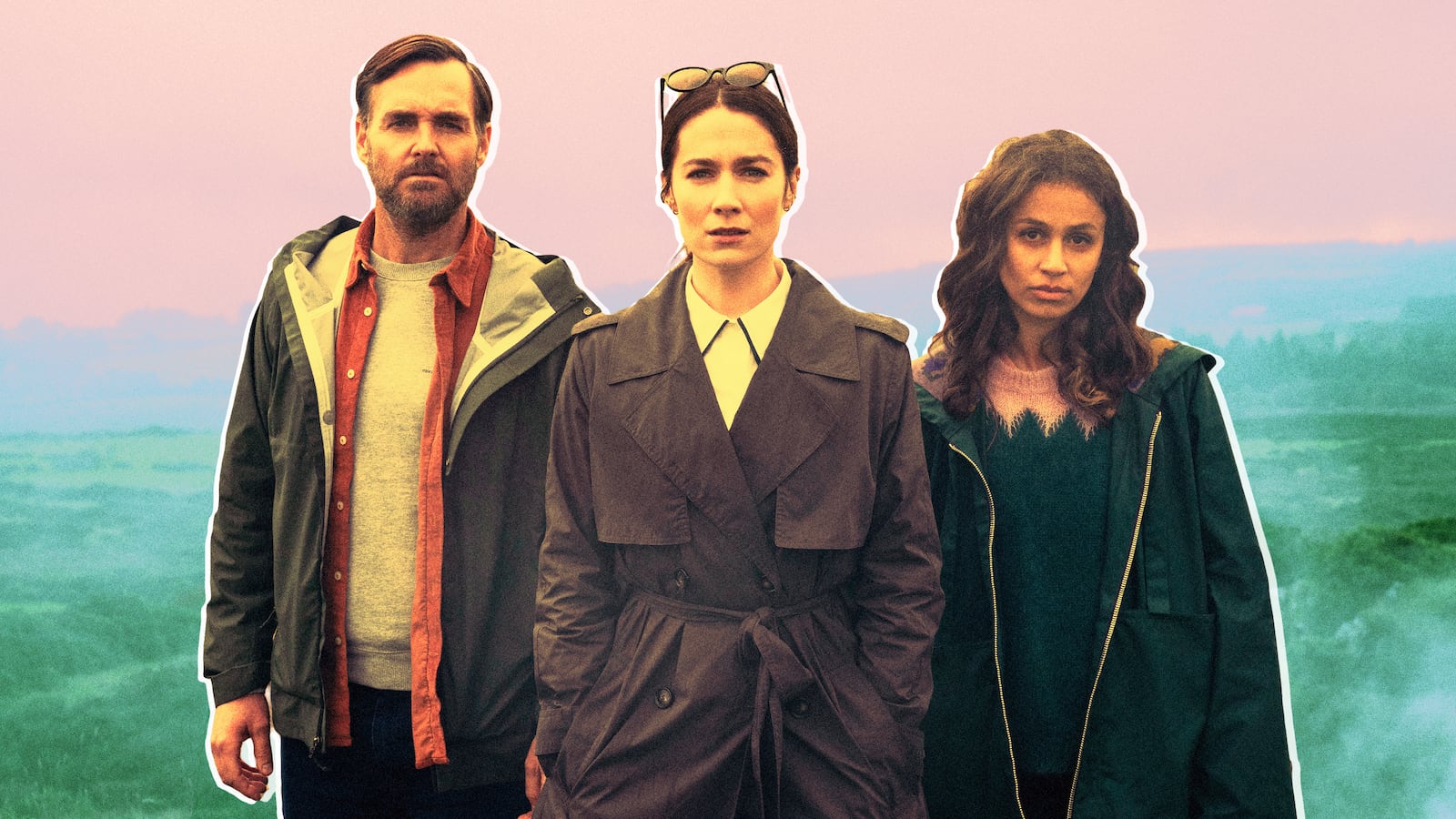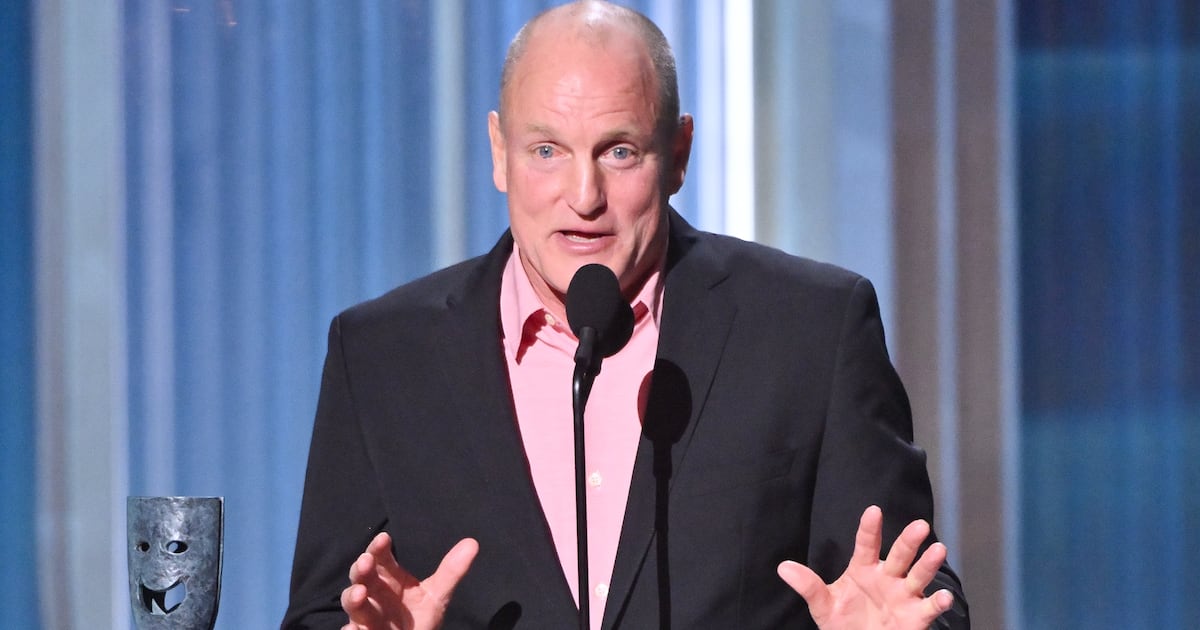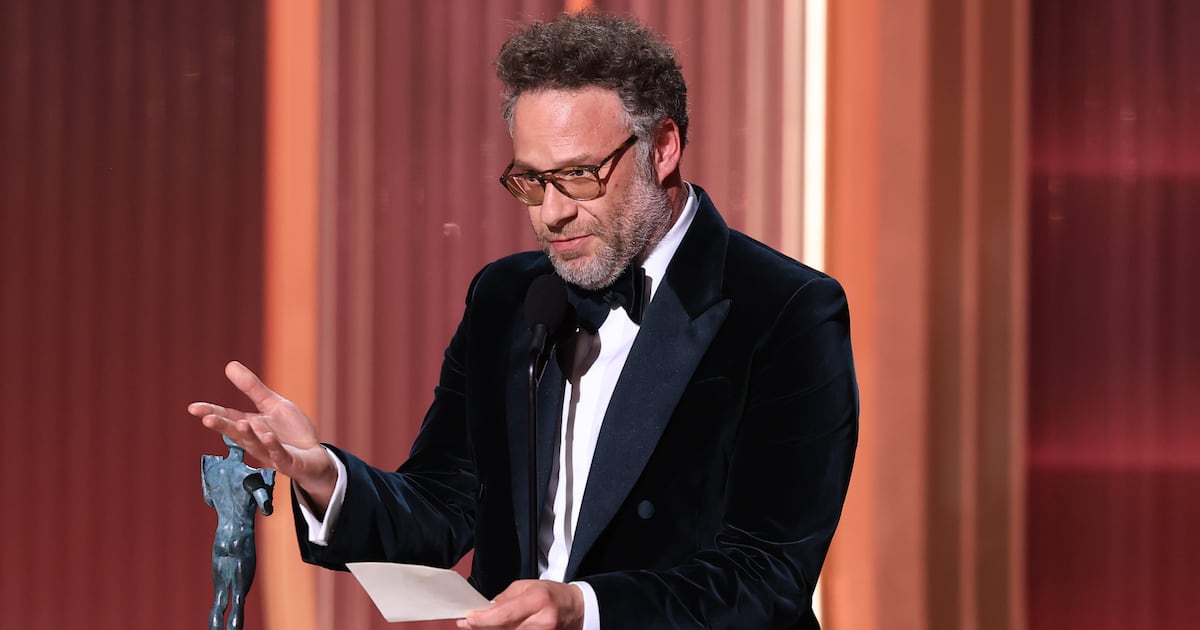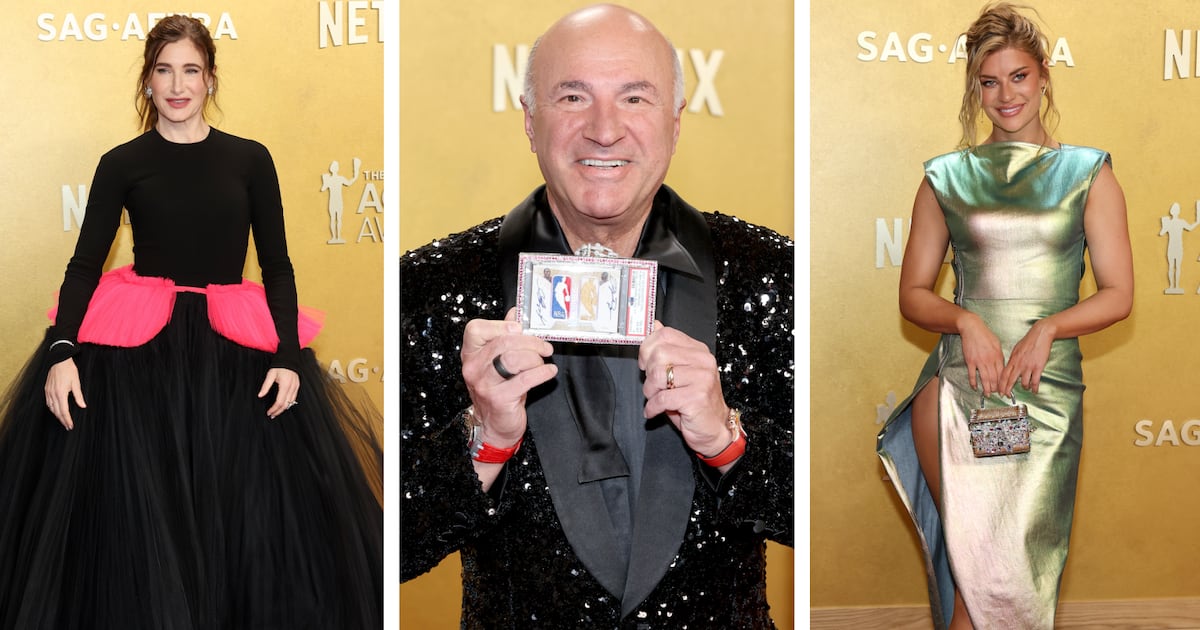You, me, and anyone with even a tangential grasp on modern technology may have true-crime podcast fatigue. But for the people of Bodkin, Ireland—the titular, fictional shoreside town in Netflix’s new mystery series Bodkin, premiering May 9—the true-crime podcast wave hasn’t even begun to crest. That’s why, when popular podcast host Gilbert Power (Will Forte), his researcher Emmy (Robyn Cara), and crotchety Guardian investigative reporter Dove (Siobhán Cullen) step foot in Bodkin, they’re welcomed with wide-eyed fascination.
That is, until the trio starts poking around, looking to cover a decades-old cold case that still haunts the town and its colorful characters. When local threads are pulled, their once-knotted history unspools, revealing dark and absurd secrets. Bodkin takes pleasure in stringing viewers along, winding itself past red herrings and red-haired residents who all have something to hide. While the series sometimes mirrors the pace of Bodkin’s small-town life too literally, drifting aimlessly to fill time, its enthusiastic cast—led by the terrifically cast Forte and Cullen—keep Bodkin stimulating enough to be more than just a knockoff Only Murders in the Building. Instead, it skewers the macabre voyeurism of true-crime podcasting, implicating its viewers just as much as its characters, to surprisingly refreshing results.

Siobhán Cullen as Dove, Will Forte as Gilbert Power, Robyn Cara as Emmy Sizergh in Bodkin.
Enda Bowe/NetflixAfter three seasons of Only Murders, last year’s Based on a True Story, 2019’s Truth be Told, and a quietly vicious Portlandia sketch, television seems to have reached its limit for shows about making true-crime podcasts. You’d be forgiven for wanting to avoid Bodkin entirely based on its stale premise alone. (You can practically hear the pitch meeting at Netflix now: “Three people investigate a crime to make a podcast—this time, in Ireland!”). But the show, at the very least, anticipates its audience’s exhaustion—something other shows don’t typically contend with.
When Siobhan’s key informant in an investigation is killed, she gets a call from her editor at The Guardian, telling her to move the case to the backburner for her safety. Instead, he’s shipping her off to Ireland with Gilbert and Emmy to work on their upcoming podcast, an order that makes the Irish native recoil. “True-crime podcasts aren’t journalism. They’re necrophilia, “ Siobhan says over the phone. Immediately, Bodkin proves itself more critical of the industry it’s detailing than something like Only Murders, which has only glorified the sometimes rapacious nature of amateur podcasting—albeit to a beloved response from viewers.
Bodkin has guts; there’s no doubt about that. Gilbert isn’t afraid to admit that the true-crime podcast fad often delivers depreciating results, remarking to Siobhan that the last two seasons of his hit show disappointed his audiences. That’s why he’s so intent on his next effort being a total knockout. Bodkin is the perfect setting for his show: a sleepy hamlet that’s still packed to the brim with covert deception, even after a mystery from 25 years earlier put it on the map.
The disappearance of multiple townspeople on Samhain—a Gaelic festival similar to Pagan Halloween traditions—rocked Bodkin, especially since their bodies were never found. In Ireland, myths and legends weave into local history and lore as much as actual events. Siobhan, Gilbert, and Emmy soon wonder how much of what they uncover about the Samhain disappearances is true and how much of it is a story, passed down so often over the years that it practically became reality.
Bodkin’s most fascinating element is its central question of what is and is not fact, and the show finds plenty of unique ways to ask it across seven episodes. Leads that seem promising quickly dissolve when they’re poked too hard, and characters like the burly and dangerous Seamus Gallagher (David Wilmot) and the soft-spoken but secretive driver Séan O’Shea (Chris Walley) are never quite who they seem to be. That enigmatic element keeps the show consistently interesting, even if it can be frustrating to be led down a path that goes nowhere. These miniature dead ends mimic the rhythm of a true-crime podcast; episodes begin and end with Gilbert’s narration, swaying viewers to keep at it even when Bodkin runs itself in circles. The resulting dizziness might be a bit much for some, but others will find joy in these lightheaded thrills.
The show necessitates some clever writing, given that its style is severely lacking. Bodkin makes little effort to craft any sort of singular visual cohesion. Its coloring is dreary, with lush, green Irish landscapes muted into grays and blues that might reflect the show’s gloomy mystery, but don’t draw the eye for more than a few moments. When Gilbert comments on how verdant the foliage is in Bodkin, it almost comes off like a joke, given that what green there is has been toned down so much in post-production—seemingly to keep the show’s characters as its central focus. After Ripley reminded the world that mysteries can be as stimulating to the eye as to the brain, it’s hard to root for such a style-deficient puzzler when we know what we could have.

Siobhán Cullen as Dove in Bodkin.
Enda Bowe/NetflixLuckily, Bodkin’s characters carry the brunt of the show on their back. The series is a genuine two-hander; when Siobhan and Gilbert investigate together, Forte and Cullen’s chemistry and their mutual commitment to fleshing out their characters’ neuroses helps the show jump off the screen in ways its subdued style otherwise wouldn’t allow. While Forte is wonderful in one of his rare dramatic roles, Cullen is Bodkin’s major scene-stealer. An Irish television star in her own right, Cullen continues her breakout year stateside after her delightful star turn in the Irish black comedy Obituary, which recently started streaming on Hulu. In Bodkin, Cullen runs away with her hard-nosed, traditional journalist character, making Siobhan real and nuanced, with scruples she won’t drop, even if she does lighten up when she realizes there is a major case to pursue. Siobhan could easily be a parody of a person, some conventional reporter who rebukes the more modern “version” of her profession. But the show’s writers refuse to make it that simple (and frankly, incorrect), insisting that true investigative skills can’t be learned just by putting mouth to mic.
By rebuffing the notion that true-crime podcasting is a viable way to solve a mystery, Bodkin finds an unusual approach to its played-out concept. Here is a show that is willing to take itself to task and bring viewers along while it works out the answer to its central question. Is Siobhan correct? Is this a predatory art form disguised as entertainment? And where is the line drawn in the search for the truth amidst murky surreality? The series may stumble while it seeks answers, but the fact that it’s willing to pose these questions at all indicates that the tide may be turning, tempering that true-crime podcast wave. Like the media genre it parodies, Bodkin understands that being ahead of the curve doesn’t really matter, as long as there is something interesting to say by the series’ end.






